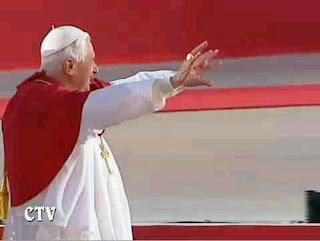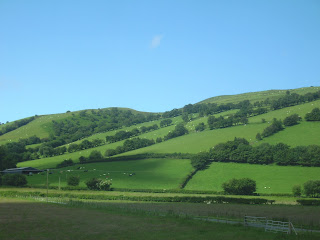Here is an address that the Holy Father gave a group of young people from a rehabilitation community. It is a clear and powerful demonstration of the teaching that the love of money is the root of all evil.

Dear Young Friends,
I am pleased to be with you at Darlinghurst today, and I warmly greet all those taking part in the “Alive” programme, as well as the staff who run it. I pray that you will all benefit from the assistance offered by the Archdiocese of Sydney’s Social Services Agency, and that the good work being done here will continue long into the future.
The name of the programme you are following prompts us to ask the question: what does it really mean to be “alive”, to live life to the full? This is what all of us want, especially when we are young, and it is what Christ wants for us. In fact, he said: “I have come that they may have life, and have it abundantly” (Jn 10:10). The most basic instinct of all living things is to stay alive, to grow, to flourish, and to pass on the gift of life to others. So it is only natural that we should ask how best to do this.
For the people of the Old Testament, this question was just as urgent as it is for us today. No doubt they listened attentively when Moses said to them: “I set before you life or death, blessing or curse. Choose life, then, so that you and your descendants may live in the love of the Lord your God, obeying his voice, clinging to him – for in this your life consists” (Dt 30:19-20). It was clear what they had to do: they had to turn away from other gods and worship the true God who had revealed himself to Moses – and they had to obey his commandments. You might think that in today’s world, people are unlikely to start worshipping other gods. But sometimes people worship “other gods” without realizing it. False “gods”, whatever name, shape or form we give them, are nearly always associated with the worship of three things: material possessions, possessive love, or power. Let me explain what I mean.
Material possessions, in themselves, are good. We would not survive for long without money, clothing and shelter. We must eat in order to stay alive. Yet if we are greedy, if we refuse to share what we have with the hungry and the poor, then we make our possessions into a false god. How many voices in our materialist society tell us that happiness is to be found by acquiring as many possessions and luxuries as we can! But this is to make possessions into a false god. Instead of bringing life, they bring death.
Authentic love is obviously something good. Without it, life would hardly be worth living. It fulfils our deepest need, and when we love, we become most fully ourselves, most fully human. But how easily it can be made into a false god! People often think they are being loving when actually they are being possessive or manipulative. People sometimes treat others as objects to satisfy their own needs rather than as persons to be loved and cherished. How easy it is to be deceived by the many voices in our society that advocate a permissive approach to sexuality, without regard for modesty, self-respect or the moral values that bring quality to human relationships! This is worship of a false god. Instead of bringing life, it brings death.
The power God has given us to shape the world around us is obviously something good. Used properly and responsibly, it enables us to transform people’s lives. Every community needs good leaders. Yet how tempting it can be to grasp at power for its own sake, to seek to dominate others or to exploit the natural environment for selfish purposes! This is to make power into a false god. Instead of bringing life, it brings death.
The cult of material possessions, the cult of possessive love and the cult of power often lead people to attempt to “play God”: to try to seize total control, with no regard for the wisdom or the commandments that God has made known to us. This is the path that leads towards death. By contrast, worship of the one true God means recognizing in him the source of all goodness, entrusting ourselves to him, opening ourselves to the healing power of his grace and obeying his commandments: that is the way to choose life.
A vivid illustration of what it means to turn back from the path of death onto the path of life is found in a Gospel story that I am sure you all know well: the parable of the prodigal son. When that young man left his father’s house at the beginning of the story, he was seeking the illusory pleasures promised by false “gods”. He squandered his inheritance on a life of indulgence, and ended up in abject poverty and misery. When he reached the very lowest point, hungry and abandoned, he realized how foolish he had been to leave his loving father. Humbly, he returned and asked forgiveness. Joyfully his father embraced him and exclaimed: “This son of mine was dead, and has come back to life; he was lost, and is found” (Lk 15:24).
Many of you must have had personal experience of what that young man went through. Perhaps you have made choices that you now regret, choices that led you down a path which, however attractive it appeared at the time, only led you deeper into misery and abandonment. The choice to abuse drugs or alcohol, to engage in criminal activity or self-harm, may have seemed at the time to offer a way out of a difficult or confusing situation. You now know that, instead of bringing life, it brings death. I wish to acknowledge your courage in choosing to turn back onto the path of life, just like the young man in the parable. You have accepted help – from friends or family, from the staff who run the “Alive” programme: from people who care deeply for your well-being and happiness.
Dear friends, I see you as ambassadors of hope to others in similar situations. You can convince them of the need to choose the path of life and shun the path of death, because you speak from experience. All through the Gospels, it was those who had taken wrong turnings who were particularly loved by Jesus, because once they recognized their mistake, they were all the more open to his healing message. Indeed, Jesus was often criticized by self-righteous members of society for spending so much time with such people. “Why does your master eat with tax collectors and sinners?”, they asked. He responded: “It is not the healthy who need the doctor, but the sick … I did not come to call the virtuous but sinners” (cf. Mt 9:11-13). It was those who were willing to rebuild their lives who were most ready to listen to Jesus and become his disciples. You can follow in their footsteps, you too can grow particularly close to Jesus because you have chosen to turn back towards him. You can be sure that, just like the Father in the story of the prodigal son, Jesus welcomes you with open arms. He offers you unconditional love – and it is in loving friendship with him that the fullness of life is to be found.
I mentioned earlier that when we love we are fulfilling our deepest need and becoming most fully ourselves, most fully human. Loving is what we are programmed to do, what we were designed for by our Creator. Naturally, I am not talking about fleeting, shallow relationships, I am talking about real love, the very heart of Jesus’ moral teaching: “You must love the Lord your God with all your heart, with all your soul, with all your mind, and with all your strength” and “You must love your neighbour as yourself” (cf. Mk 12:30-31). This, if you like, is the programme that is hard-wired into every human person, if only we had the wisdom and generosity to live by it, if only we were ready to sacrifice our own preferences so as to be of service to others, to give our lives for the good of others, and above all for Jesus, who loved us and gave his life for us. That is what human beings are called to do, that is what it means to be truly alive.
Dear young friends, my message to you today is the same one that Moses proposed all those years ago. “Choose life, so that you and your descendants may live in the love of the Lord your God”. Let his Spirit guide you onto the path of life, so that you obey his commandments, follow his teachings, leave behind the wrong turnings that lead only to death, and commit yourselves to a lifelong friendship with Jesus Christ. In the power of the Holy Spirit, choose life and choose love, and bear witness before the world to the joy that it brings. That is my prayer for each one of you this World Youth Day. May God bless you all.
 The basilica
The basilica The main altar
The main altar The crypt
The crypt






























